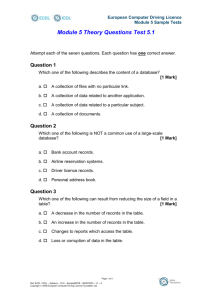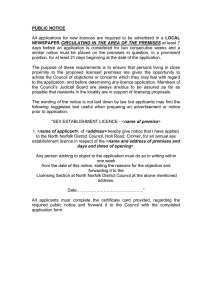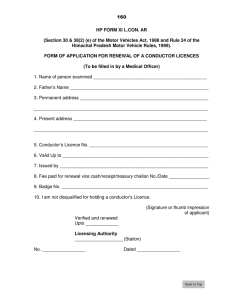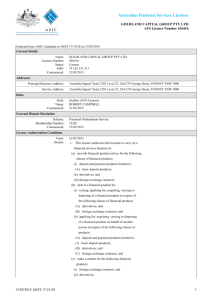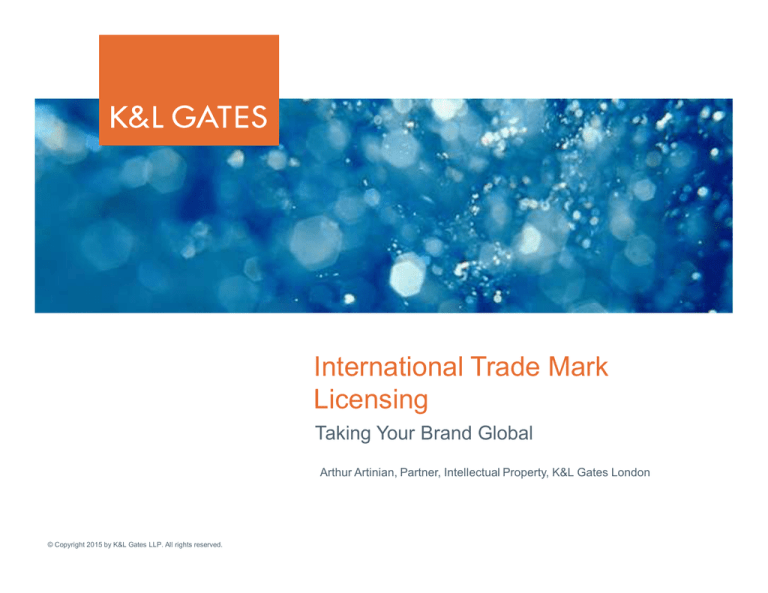
International Trade Mark
Licensing
Taking Your Brand Global
Arthur Artinian, Partner, Intellectual Property, K&L Gates London
© Copyright 2015 by K&L Gates LLP. All rights reserved.
Welcome
Arthur Artinian
Partner
London
T +44 (0)20 7360 8207
F +44 (0)20 7648 9001
arthur.artinian@klgates.com
2
Overview
Business conversations to drive international licensing projects
Key issues for licensing across multiple jurisdictions
Key antitrust considerations
Managing disputes and enforcement
Licence formalities, registration requirements and risks
Red flags - when to engage local counsel and specialists
Future-proofing brand licences
adapting key provisions for compliance with international trade mark laws
giving your standard form licence agreements an “international refresh”
3
International licensing can take many forms
Entering new
markets
• Licence
• Franchise, Joint Venture or partnership
Brand
extensions
• Product or service diversification
• Merchandising
Business
operations
• Manufacturing, distribution
• Outsourcing, service delivery
Business
transactions
• Acquisition or disposal of business
• Brand “splitting”
International
structuring
• Tax and transfer pricing
• Restructuring
Disputes
• Settlement and co-existence
• Cross-licensing
4
International licensing is complex
Contract
Dispute resolution
Regulation
Tax
Antitrust
Patents
& Know
How
Designs
Trade
Mark
Goodwill
& related
rights
Copyright
5
Key business conversations
Consult sales, marketing, product development, PR, digital, accounting,
management and/or legal representatives
Where are we taking the brand? What are our future plans?
Is it a franchise or a licence?
Are we granting exclusive rights – e.g. by territory, sector?
What type of royalty or fee structure do we require?
Legal and commercial diligence on licensee
Legal and commercial on local regulatory framework
How is our brand protected locally?
registered IP rights, unregistered rights
localised branding: translations, transliterations, character marks, sub-brands
domain names and social media accounts and notifications
How will we manage digital and social media presence?
6
"ROW" Considerations
Nomenclature
Trade mark, Trademark, Trade-mark
Licence, License
Exclusive, sole, non-exclusive, sole and exclusive, irrevocable
Indemnify
Territory
Madrid trade marks
Regional trade marks (CTM, Benelux, OAPI, Eurasian TM)
EU unitary rights – current and future member states?
Future markets - diligence? who assumes risk?
7
8
Territorial Considerations
Rights within territory
Each relevant act of infringement
Ability to permit third parties to do those acts
All goods and services or only some?
Rights outside territory
Import, export
Goods in transit
Manufacturing and distribution rights
Rights not restricted by territory
Internet
Digital and social media
Generic top level domains
Global website
landing pages
Geoblocking
Division of
domain names
Country
specific social
media presence
Presence on
auction and
retail platforms
9
"ROW" Considerations
Cultural and linguistic context
Controls on translations, transliterations, character marks
Localised branding, sub-brands
Regulatory restrictions e.g. labelling and advertising regulation
Term and renewal
Long term or perpetual agreements can be problematic
Tacit or automatic renewal provisions (e.g. France)
Enforcement rights
Additional licensee rights under domestic legislation
(e.g. UK, Australia)
Requirements for TM owner to be party to any proceedings
10
"ROW" Considerations
Quality control
Sensible level of control over licensee uses
Prior approval rights for every use not necessary
Explicit intention to exercise control over quality
Dispute resolution and governing law
Mechanism: arbitration, mediation, court, bespoke?
Location: neutral territory?
Agreed exceptions to dispute mechanism (e.g. injunctive relief)
Tax
Transfer pricing and tax risks where royalties paid across borders
Differing approaches to withholding tax under domestic legislation
Is VAT payable and included in quoted fees, royalties?
Who bears risk for withholding tax? Who bears currency risk?
11
Competition / Antitrust considerations
Exclusivity
What justification exists for exclusivity?
Problematic where restrictions between EU member states
Permission for passive sales
Restrictions and prohibitions
No-challenge clauses
Minimum sales prices or price fixing
Non-competition outside context of IP rights
Termination rights
Termination right based on challenging validity of IP rights
in non-exclusive licences problematic
12
Licence formalities
Licence might need to be:
In writing
Signed by Licensor
Signed by Licensee
Notarised
Legalised
Apostilled
Approved by a regulatory body or authority
Compliant with mandatory provisions on domestic rights or assets
Compliant with requirements to adequately define the licensed property
(e.g. full trade mark details in schedules, IR vs national designations)
Registered or recorded on domestic trade mark register
13
14
Registration of licences and interests
Validity of licence and/or trade mark dependant on registration
Use by licensee only recognised if licence registered
(e.g. to defeat a non-use action)
Licence involves national rights which cannot legally be
licensed without registration
Registration confers benefits with respect to enforcement
Only registered licence can be relied on in domestic proceedings
Registered licence effective against innocent third party conflicting
interests (e.g. EU and UK)
If registered within a prescribed period, licensee can claim costs of
proceedings relating to infringements before registration
(e.g. UK)
Public notification of rights and deterrent
15
Registration of licences and interests
Registration confers benefits with respect to local legal and
regulatory issues
Remittance of royalties abroad facilitated by registration
(e.g. China, Brazil, Japan)
Prima facie evidence of a valid licence (e.g. South Africa)
Domestic permits, licences and funding facilitated
Tax benefits
Registration not possible or no benefits of registration
16
Registration of licences and interests
International registration strategy – is it worth the expense?
Dependent on a range of factors:
Number of RED countries
Longer term or perpetual
Relationship between the parties
Nature of trade mark rights
Presence in, and familiarity with, licensed territories
Practicality of enforcement and local monitoring
17
Registration of licences and interests
National vs Madrid Protocol registration
Germany, Australia and New Zealand excluded
National recordal required in China, Colombia, Georgia, Greece, India, Japan,
Kyrgyzstan, Lithuania, Mexico, South Korea, Moldova, Russian Federation,
Singapore and OAPI
Key licence provisions
Licensor required to register or assist with registration?
Who controls and pays for recordal process?
Who prepares recordal documents?
Agreed form recordal licence attached?
If there is a choice to register or if registration would benefit the Licensee, can
Licensee require registration?
What is procedure for removing registrations on expiry or termination of licence?
Interim licence to use until registration achieved?
18
Red flags
Licence grant
Buzz words – exclusive, sole, non-exclusive, irrevocable, indemnify
Legal status of rights – pending applications licensed?
Rights within and outside territory or channels
Perpetual / surviving obligations
Indemnification provisions (e.g. loss of profits, excluded liability)
Termination triggers for challenging IP rights
No-challenge, non-compete provisions
Price controls
Territorial or channel-based restrictions
Current and future registration and enforcement obligations
Anti-bribery, FCPA compliance, data protection
19
Standard form licence agreements
Define or spell out key concepts
“Exclusive means to the exclusion of all other persons, including the Licensor”
“Material breach includes any breach of clauses 5, 7, 8 and 10.”
“Customary Trade Expenses means…” etc
Minimise reliance on domestic contractual concepts
Reasonable endeavours, best endeavours, best efforts, best commercial efforts
Include obligations on licensor or licensee to co-operate in good faith with
respect to unexpected domestic issues
Build procedures for expansion, registration of new rights, business planning
Use “to the extent permitted by applicable law”
Use warranties, representations and acknowledgements
Include severability provisions
20
Alternative approach to licensing projects
Local
counsel
Business
In house
counsel
In house
counsel
Local
counsel
Local
counsel
Local
counsel
Local
counsel
Business
Global
counsel
Local
counsel
21
Questions
23


